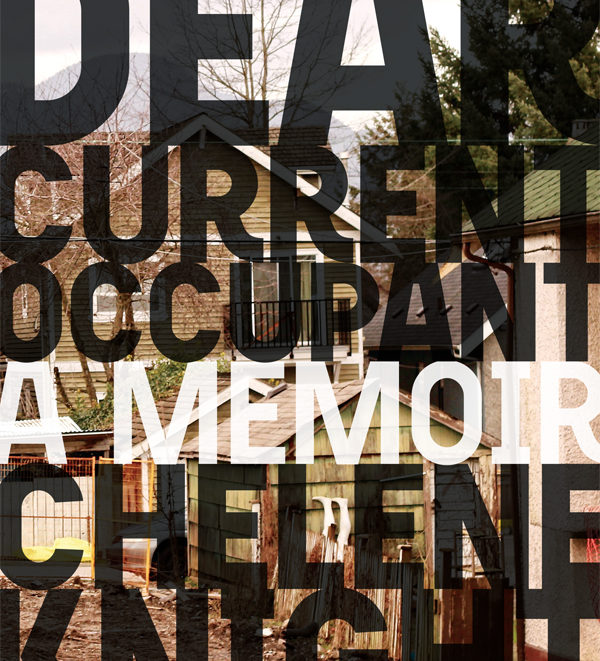
Review by Mormei Zanke
Chelene Knight’s new memoir Dear Current Occupant, defies traditional genres of writing through its inherent hybridity and fragmentation. The book delves into Knight’s childhood past, exploring her experience of growing up while moving in and out of twenty homes in East Vancouver. Knight weaves poetry, essays, letters, and photographs together to create a work that is halting and profoundly moving. Knight’s fragmented approach succeeds in exploring the truths of her past more than any conventional, linear method could.
Knight is able to capture snapshot moments from her youth in a way that doesn’t feel antiquated. On reading her recollections I was struck by their immediacy. Knight brings her past forward into present day, something that can be difficult to achieve in memoir. It’s this dichotomy between past and present that I believe is the central tension of the work, and this is what kept me turning the pages until the very end.
The collection reads like a long conversation, with the often addressed you existing somewhere off the page, their identity oscillating between family members, current occupants from past homes, and Knight’s younger self.
Knight writes in a tone that feels both cautionary and kind. In many of her entries, she welcomes the reader in, while also emphasizing necessary instructions for resilience.
“Don’t ever leave your favourite book unattended. Imagine someone else
turning its pages, creasing its spine, running their fingers up and down
the words you’ve already memorized. There’s something you need to know
about winter”
There is a sense of an older Knight looking back on her past with wisdom and a degree of urgency. Her writing demands places and memories are remembered, documented, and preserved. The reader is offered glimpses into personal spaces and situations that examine childhood trauma and adversity but also explore courage and strength in the wake of these challenges.
Knight also focuses on the minutiae, recalling sensory details of the homes she once inhabited.
“Ten people in a three-bedroom upper suite. Vancouver special. The walls
covered in tiny fingerprints. Bugs in the bed, crumbs on the stove, broken
Transformers and Lego pieces, and Cheerios and dirty mismatched socks
scattered on the beige carpet. I kept my small treasures under my pillow”
Passages like these mirror the larger structural organization of the book. She uses short clipped sentences, giving the impression of disjointed memory. She also employs a list, which adds movement to the description of her “[h]ouse we all shared on Forgotten Street.” Her repetition of and, suggests her recollection of the past never really ends. Fragments always remain and additions are constant, making Knight’s past a story that is retold, reimagined, and modified as time goes on.
“A clothesline hung from thick rope is the only
piece of sweet silence, swingin’ north to south
between two poles planted deep in the dirt”
What Dear Current Occupant ultimately seeks to define is the concept of home. In the endnotes of the book Knight admits, “it took reading and listening to many other voices speak of home and lack thereof for me to start piecing together the fragments of home I have so desperately been looking for.” Through Knight’s investigation of the many different houses she once inhabited as a child, she reveals the complicated and sometimes difficult process of defining home when home-spaces are changed or altered. Maybe what Knight is proposing is that a person is not necessarily defined by the spaces they exist in, but that they can define these spaces for themselves. Knight captures this sentiment when she writes: “This isn’t the first time I’ve built my own place.”
If you want to know more about Dear Current Occupant, here’s Amber Dawn’s interview with Chelene Knight.
Mormei Zanke is a Canadian poet whose work has appeared in The Maynard and the Hart House Review. She recently graduated from the University of British Columbia where she studied English Literature and Creative Writing.